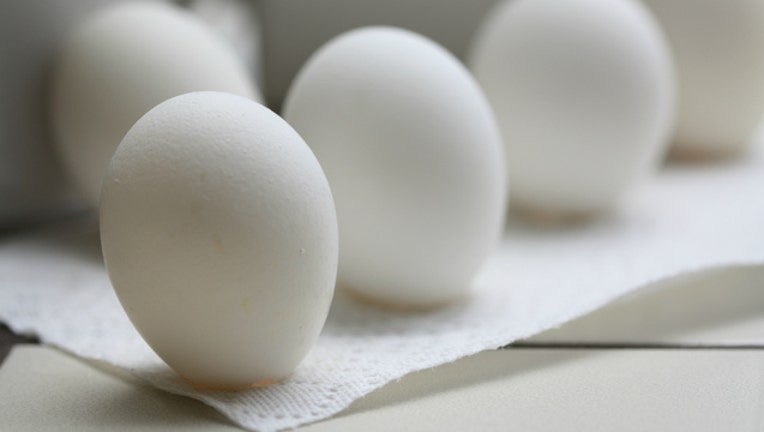Prop 12: California voters overwhelmingly approve cage-free eggs

Eggs stock photo by John Morgan via Flickr
SAN FRANCISCO (AP) - California voters overwhelmingly approved a measure Tuesday requiring that all eggs sold in the state come from cage-free hens by 2022.
With 93 precincts reporting, Proposition 12 won 61 percent of the vote.
Proposition 12 also bans the sale of pork and veal in California from farm animals raised in cages that don't meet the new minimum size requirements. That means the Golden State's new rules will apply to farmers nationwide whose eggs, veal and pork are sold in California.
Supporters say the measure is a big step toward more humane farming practices, while opponents say it is misleading and maintains cruel practices for animals.
Dubbed the Prevention of Cruelty to Farm Animals Act, Proposition 12 builds on an earlier ballot measure, Proposition 2, that passed in 2008 and banned keeping hens, calves and pigs in tiny cages so cramped they couldn't stand up, lie down or turn around.
That measure took effect in 2015 but lacked specific size requirements and did not apply to out-of-state farmers whose products were sold in California.
Proposition 12 specifies how much floor space farmers need to give each animal.
"Change is coming," said Josh Balk, vice president at the Humane Society of the United States, which sponsored and financed the measure. "This vote is a massive blow against industrial animal agriculture's abusive confinement systems."
It requires that, starting in 2020, calves confined for production have at least 43 square feet (4 square meters) of usable floor space, while breeding pigs be given at least 24 square feet (2.2 square meters) of floor space in their pens starting in 2022.
Starting in 2020, egg-laying hens must be been given 1 square foot (144 square inches) of floor space each on the way to being cage-free by 2022.
The measure also had support from several animal welfare groups, including the American Society for the Prevention of Cruelty to Animals, Sierra Club and Center for Food Safety, and a variety of veterinarians and religious organizations.
The Humane Society, which also sponsored Proposition 2, says the upgrade will strengthen the earlier measure and restore California as a leader in the ethical treatment of farm animals.
A decade ago, Proposition 2 was the furthest-reaching law for farm animals in the country. Since then a dozen states have banned or restricted confinement for at least one farm animal. Massachusetts passed a comprehensive measure in 2016 that is similar to Proposition 12.
Among those opposed to the measure were the National Pork Producers Council and the Association of California Egg Farmers, which said it will raise costs for farmers and, as a result, prices for consumers.
Bradley Miller, a spokesman for Californians against Cruelty, Cages and Fraud, which led a "No on Proposition 12" campaign, said the measure makes misleading claims and does little to end cruelty to animals in the near term.
"We are vehemently opposed to the 1 square foot per hen cage space," said Miller, who is also president of the Humane Farming Association. "It is a cruel step backward."
The nonpartisan Legislative Analyst's Office says Proposition 12 would likely result in an increase in prices for eggs, pork and veal partly because farmers would have to remodel or build new housing for animals.
It could also cost the state as much as $10 million a year to enforce and millions of dollars more a year in lost tax revenues from farm businesses that choose to stop or reduce production because of higher costs, the office said.

